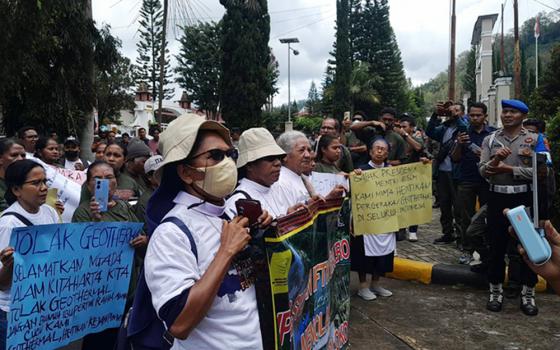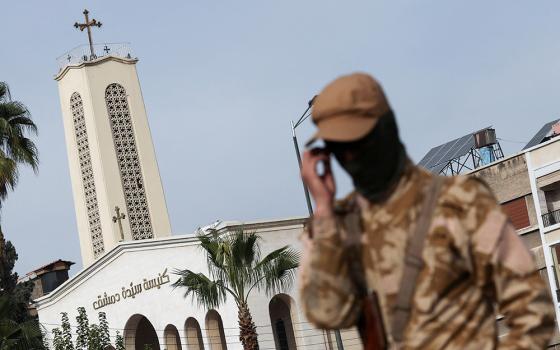This week, the Vatican’s office for ecumenism, the Pontifical Council for Promoting Christian Unity, is hosting a summit titled “Harvesting the Fruits," bringing together leading lights from the Catholic church, Anglicanism, Lutheranism, Methodism, anbd the Reformed churches. The idea is to figure out how the movement for Christian unity can move into what Cardinal Walter Kasper, the council’s president, calls a “more mature” phase, despite what many perceive as a big ecumenical chill. In addition, the hope is also to hand the torch to a new generation of leaders, given that many of the pioneers of the ecumenical movement are now passing from the scene.
One of those prospective new leaders in Rome this week is Anglican Rev. Ephraim Radner, a professor of theology at the Wycliffe College of the University of Toronto. Radner helped draft the “Anglican Communion Covenant,” an attempt to respond to deep divisions within Anglicanism over matters such as homosexuality and women bishops by identifying sources of authority with real teeth. (The covenant, issued in December 2009, offered four such pillars: the Archbishop of Canterbury, the Lambeth Conference, the Anglican Consultative Council, and the Primates’ Meeting.) For himself, Radner has taken the view that homosexuals should not be ordained, nor should their partnerships be affirmed, for “Scriptural, traditional, and moral reasons.”
Radner sat down with NCR on Feb. 10 to talk about this week’s summit, as well as the fate of the Anglican Communion. The following are excerpts from that interview.
Cardinal Walter Kasper in his opening address on Monday said that we are entering an ecumenical phase that may be less exciting but more mature. Do you agree?
I think that’s true, and I think it’s also a challenge. Lots of people know how to do the old stuff … you have a problem, you sit down and talk about it. For instance, the "Joint Declaration on Justification" is viewed as a classic case where the two traditions [Catholics and Lutherans] took a 16th century problem, worked it over, pulled it apart, and realized that they could translate language and concepts and come to a place where it all looks kind of compatible. That’s the notion, "compatible not contradictory." One of the big issues in the cardinal’s book, however, is that with many of these big issues, they’re not totally resolved, and that way of resolving them seems to have run its course.
What exactly has run its course?
This idea of taking concepts, pulling them apart, finding common language that can lie behind all these different methods. The basic notion, to take a completely different example. is what happened in the dialogue between Catholics and Oriental Christians on Christology. Lo and behold, after 1,500 years it turns out it was all a historical misunderstanding. You’re pulling apart culturally conditioned linguistic concepts.
The concept being that if we work at it hard enough, we are going to find a core of agreement?
Yes, so people speak in terms of consensus. I think the question now, though, is what has happened to all of this? Where has it gone? How do you move from having a bunch of theologians get together to coming to this sort of articulated consensus, to actually making a difference beyond the sort of respect and friendship that come out of these things?
One challenge is to sit down with your Christian partners, in this case the Catholic church, and not just having the theologians talk, but the real decision-makers. For example, the curial members should be engaged, not just a front of theologians.
Do you pick up concern about that on the Catholic side?
One of the things I’ve realized is that I think the Pontifical Council wants the support of their ecumenical partners for their own sense of vocational engagement in the years to come. I gather that’s sort of in question. Maybe it’s just the nature of the internal politics of the Vatican, but I gather that this isn’t really on anybody’s priority list.
If what you want is to move from a conversation among theologians to one among real decision-makers, it’s easy to know what that would look like for the Catholic church. But what about for other Christian churches? Who would be at the table?
We talked about that. One of the big issues, and I’m not the only one who raised it, is that a big cultural shift has taken place over the last forty years. There’s been a breakdown of authoritative teaching structures in the Protestant churches. To some degree the same thing has happened in the Catholic church too, not in the structures so much as in the reception. In Protestant churches, it’s the structures themselves.
Then you have the whole cultural reality on the other side, one part of which is that younger Christians don’t see church diversity and division as problematic. They don’t make the connection between the vocation of Christian unity, as an evangelical vocation from Christ himself, and the way that the churches actually function. They’re used to diversity. You saw the Pew Report of a couple of years ago, that something like 45 percent of all Christians in the United States, including a lot of Catholics, started somewhere else. They were in one church, then they go to another and another.
You put those two things together – the breakdown of structures, which is a little scary even for the Protestant churches, however much they were themselves separated and multiplied – plus this notion of division itself as not so bad, because it means choice. We all get along, so why make this like it’s some big problem? We’re all friends now. We don’t get excommunicated for visiting somebody else’s church.
What’s the future of the Anglican Communion?
We’re at a crossroads. One thing I’ve learned is that crises are always much more extended than you think they’re going to be. You keep thinking, unless they figure this out now, the whole thing is going to fall apart. That’s not quite true, it’s more slow-motion than that.
It’s a crossroads we’ve identified for several years now: Will the Communion become two separate functioning groups, not just in spirit – which in some sense it already is, but not quite – but also structurally, between a more conservative global South with some other Western appendages, and a Western-type Anglo church, more liberal in different ways and to different degrees. That’s certainly a real possibility. I keep changing my bets every week … at the moment, I put it at 50/50.
If it does happen, in my view there are two real losses, One is that Anglicanism in the West is not exactly flourishing. Of course, lots of churches aren’t flourishing, for lots of reasons. But Anglicanism is not well-placed to flourish in the U.S. or England. It won’t go away, but it’s shrinking, and it will lose it sense of why it’s there. There will still be arguments going on. It’s not exactly a death wish, but it’s certainly not a prescription for health.
In the global South, who knows what it could mean? But it might mean a kind of self-consignment to an ‘Evangelicalizing’ of Anglicanism. Again, it won’t disappear, but it will become increasingly indistinct from a whole realm of Evangelical Protestant churches which, in some ways, I think, are ephemeral in the long term as ecclesial realities. I believe in the church as something visible and real.
Let’s assume things play out that way. Will this more evangelical bloc in the global South be a better partner for the Catholic church because of its conservative moral positions? Or will its evangelical ethos actually make it less amenable to ecumenical cooperation?
One of the things that came up at this meeting is, where are the Christians from the global South? I don’t know who invited whom, but they’re not here … whether from Asia, Africa, Latin America, or wherever. There’s nobody from Anglicanism, and really nobody from any of the churches, including the Catholic church. Why is that? Sure, they don’t have the money and they don’t have the theological luxury of training ecumenists and so on, but is that all?
You’ve put your finger on something. It’s not clear to me that evangelical Anglicanism as represented by places such as Nigeria, despite the fact that there are a lot of convergences on moral questions, is really well-placed to engage ecumenically.
A lot of Catholics might listen to you talk and say, ‘Great, we’ll just wait for all this to shake out and then do our business with the global South, with whom we already agree on most things.’
It should be said that the level of competition and suspicion between Protestants and Catholics, including Anglicans, in many parts of the global South is very high. It’s very different than what one sees in the West.
What was your reaction to Pope Benedict XVI’s recent decision to create ordinariates to welcome former Anglicans?
Personally, I was of the view that it was an unfortunate sort of PR move. I’ve heard all the different stories about how it happened, but leaving that aside, the fact that it happened was not helpful for a lot of people. It got people angry at [the pope]. It also drew a lot of attention to certain realms of Anglican existence which, as it turns out, are a lot more fraught and complicated than some realized.
As a result, what people saw were caricatures, first of all of what the pope’s document really was, and second what certain Anglicans want or need. It therefore wasn’t clear what the significance of the whole thing was. I think it’s all died down a bit, especially as people look at it and realize that this is a far more limited reality. It’s still not clear who wants it.
Do you agree that the interest in the Anglican world in joining one of these ordinariates is fairly limited?
Based on what I know, I would say that’s probably quite true. There are reasons for that historically. Anglo-Catholicism of the kind of Newman sort, those who see him as their patron or paradigm, has slowly disappeared over the last century within the Anglican church. Even in my own lifetime, Anglo-Catholicism has become more or less a dead movement, and it has been for decades. That’s partly a result of the kind of Anglicans involved in that, as well as the dilution of theological integrity within Anglicanism in general, which has meant that there wasn’t a fertile ground for these things to grow. It became sort of ritualistic, grouped in little cliques. There are certainly still good and worthy Anglo-Catholics, more so in England, but at least in North American they can be hard to find, and those who are there you wouldn’t necessarily want to encourage. They’re been part of a problem, not a stream of vitality in the church. Those who are most interested in leaving Anglicanism and joining the Catholic church in a formal way tend not to come from there, but there are actually a lot of ex-evangelicals.
The other thing is, what’s being offered in terms of Anglican usage isn’t actually all that Anglican and hasn’t been in Anglo-Catholic circles for a long time. A lot of Anglo-Catholics use Roman Tridentine forms translated into Elizabethanized Masses and so on. People who want to become Catholic typically don’t want to do it in a way so that they can keep saying the Book of Common Prayer, which some of them actually don’t even like.
You don’t intend to sign up?
It’s my prayer that I die in communion with Rome, but I also feel that I have a vocation, as I know a lot of people to do, to allow that to happen not just for me, but as part of a larger Christian witness of what it means to be faithful together in Christ.
That’s your hope, but is it your realistic expectation?
I don’t know. Part of it is that I’m still part of something that’s in via, that hasn’t travelled its path yet. In this world, will that still be the case for me, personally? I don’t know. My first missionary work was in Africa, in Burundi, and I’ve done a lot of work in Haiti. Those are the people I think about. The people in America can do whatever they want. I don’t mean their souls are worth less, but they have luxuries of choice and possibilities that other people don’t. We serve on behalf of a much larger people, including vast realms of Christians around the world from Anglicans to Pentecostals, and I want to be part of that too. Those are the ones we’re responsible to, and my just deciding to do ‘x’ isn’t going to do it. I want to be part of a movement that can be engaged with that larger reality.



